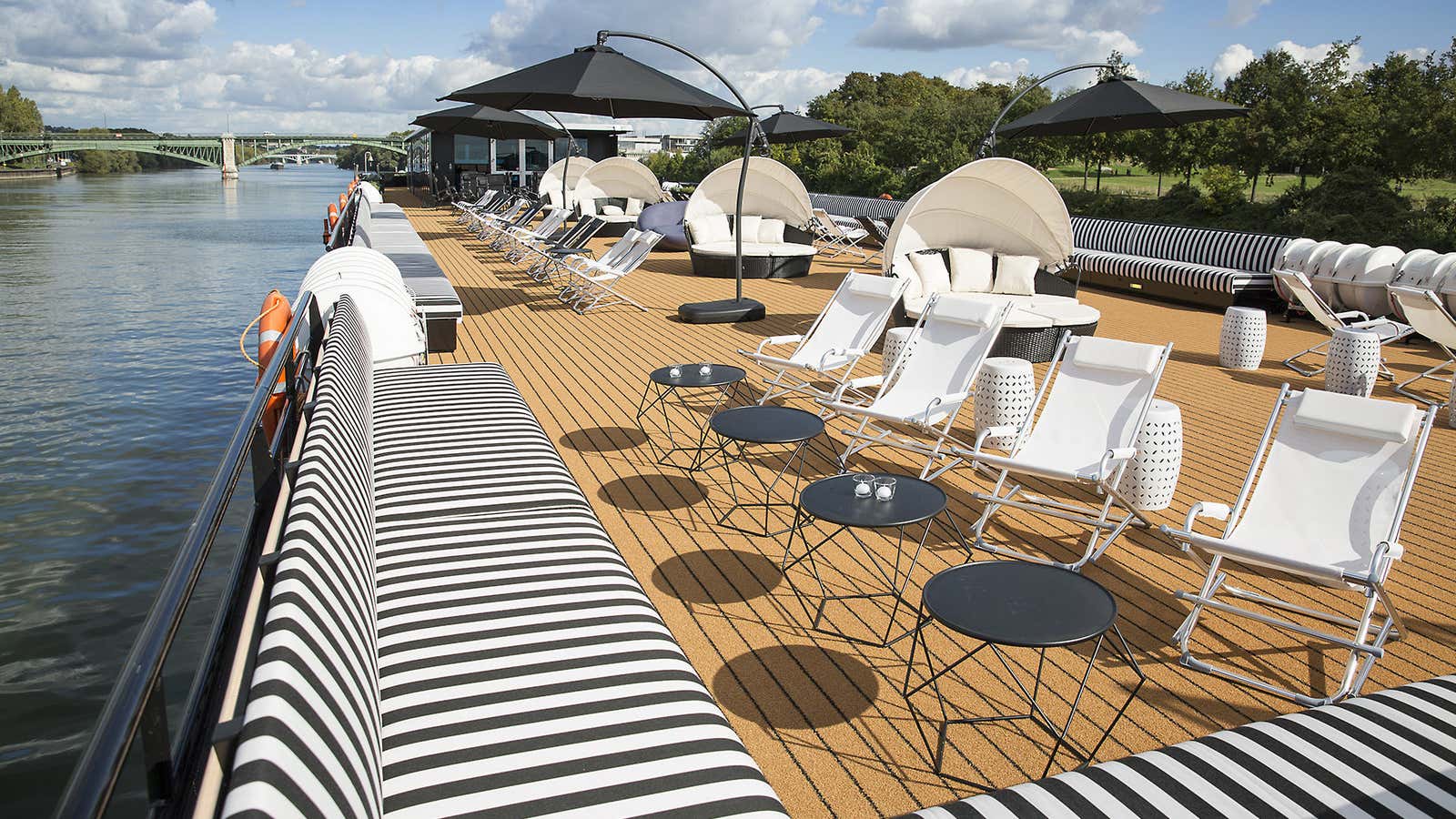The tropes used to market stuff to “millennials” are familiar to anyone with an internet connection: Experiential and immersive, Instagram-optimized, cheaper than the standard option, and complete with USB ports.
Yet when it comes to travel, the millennial moniker is being used especially indiscriminately by marketers these days. AirFrance named it’s new low-cost, long-haul airline “Joon” (which rhymes with the French word for young, jeune) to get the demographic on board, while millennial-focused tour operator Contiki commissioned a report from a Columbia business school social psychologist to show how travel turns us into “global citizens.” And don’t forget Marriot’s play to take a shot at Airbnb with space-saving furniture and “furiously fast and free Wi-Fi” at its new Moxy Hotel in New York.
But perhaps the most over-the-top example of millennial marketing is a new cruise concept from luxury cruise operator Uniworld. Launching in April 2018, the “U by Uniworld” river cruise will be open only to 21 to 45 year olds. Offering what it calls “immersive experiences along popular rivers across Europe,” it comes equipped with a literal boatload of made-for-Instagram features: two rooftop venues, farm to table cuisine complete with peanut butter bacon bars and quinoa burgers, silent discos, mixologists, yoga classes, and an all-matte black exterior.
The October unveiling of one of the first of two ships—which is depicted in the video above by two influencer guests (start at 16:00)—included what a press release described as “a drum circle creating a spiritual energy onboard, sabering champagne on the top deck, and a renaming ceremony where guests released bio degradable lanterns.” The ship even comes with its very own brand ambassador: Victoria’s Secret model Petra Nemcova.
The typical demographic for Uniworld’s existing cruises skews much older (50-65) and their products are far more expensive than the U cruise, which starts at £159 ($212) per person per day. Thus, this move to diversify their offering makes economic as well as “social” sense. And while there’s nothing inherently wrong with tailoring products to certain demographics, the lack of nuance and reliance on stereotypes in the millennial travel market seems to have reached absurd, almost counterintuitive, new heights.
Indeed, if we assume that millennials value novel experiences and reject many of the standard markers of capitalist success of their parents, then wouldn’t a pre-packaged, self contained travel experience such as a cruise be exactly counter to what one might try to should market to them? But, the logic goes, if you add quinoa and yoga—who cares?
As Jia Tolentino deftly pointed out in the New Yorker recently, “the type of millennial that much of the media flocks to—white, rich, thoughtlessly entitled—is largely unrepresentative of what is, in fact, a diverse and often downwardly mobile group.” The same could generally be said for marketing and product development departments of travel companies. While they seem to have grasped the idea that millennials still want to travel despite having less money and financial security than their parents, most have failed to differentiate among the demographic any further than that.
According to Lucie Greene, Worldwide Director of the Innovation Group (which is J. Walter Thompson’s research and innovation unit) this is a bad business move. There is a considerable amount of stratification in what is treated as the millennial travel monolith, and many companies are missing out on opportunities to tailor to the different subgroups—and ultimately boost bottom lines.
“There’s the frequent traveling millennials, for whom any kind of reward system or is incredibly compelling and you have the corporate warrior, for whom brands like Joon appeal,” Greene said. “Then you have the Xennial traveler between 30 and 40 who wants to stay in a luxurious hotel but doesn’t want it to feel corporate, giving rise to brands like Hoxton Hotel in London. Lastly you have millennial and Xennial families who are still motivated by food, music, more intrepid forms of travel—even with kids in tow.”
The travel industry is certainly not the only culprit when it comes to treating millennials as an Instagram-motivated mass. Indeed, some media organizations are giving up on the term altogether thanks to its unfettered use. However as the way we travel continues to evolve, they’d do well to refine their strategy beyond a hashtag and gluten free breakfast option. Pretty soon, a cheaper ticket, free wifi, and an Aperol spritz on a rooftop bar will hardly be a USP.
